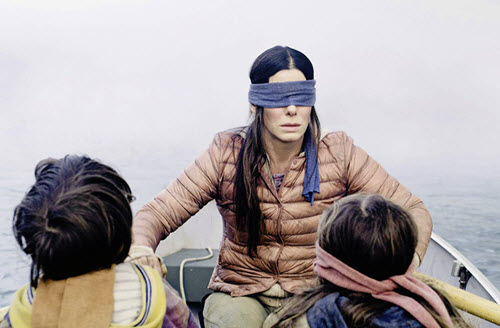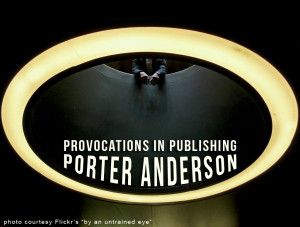Hiding Your Eyes From Edits?
By Porter Anderson (@Porter_Anderson) | January 18, 2019 |

An iconic promo shot from ‘Bird Box.’ That’s Sandra Bullock at the oars with Julian Edwards , left, and Vivien Lyra Blair. Image: Netflix
‘Don’t Open Your Eyes’
While I confess that I’ve been tempted to wear my #BirdBoxChallenge blindfold when editing other people’s copy, I was wide-eyed when Josh Malerman told me that he’d had absolutely no problem turning over Bird Box to the film’s producers and to Eric Heisserer who wrote the screenplay. (No spoilers here whatever, read forth in confidence.)
You may recall that we referred to Bird Box and Malerman in 2014–his debut novel from HarperCollins/Ecco that year is the book behind the new Netflix film. In 2014, he did an onstage interview with me at a Writers’ Digest conference in Los Angeles and was having meetings at 21st Century Fox, which is where the options trail for the show started. It would move to Universal and then on to Netflix before being released on the streaming platform on December 21.

Josh Malerman
As you may know, the film has become the most-watched of Netflix’s original film debuts to date, drawing 45 million households (Netflix is in 190 countries) in its first week. And to everyone’s alarm, it has spawned a lot of not-too-safe #BirdBoxChallenge Instagram walkings-into-walls by fans who blindfold themselves in funny (or not) situations.
It’s a big hit, in other words, a great success story for Malerman and his agent Kristin Nelson, and a really intense film by director Susanne Bier, if you haven’t seen it.
When Malerman and I reconnected to do an interview for Publishing Perspectives, though, one of the things that struck me was that Malerman said he’d been perfectly happy to let go of the book, and hand it over to the studio people. “Basically, I had no say,” he told me, and he was flown just once to the set to see things underway. No one asked for his input, although he felt comfortable in what he found was an extremely efficient, businesslike, hysteria-free set run by Bier, a Copenhagen native. He was warmly welcomed, he said, but not … needed.
And while every part of a nearly six-year march from option to release (it was first optioned in 2013, a year before Harper published it) was probably excruciating, Malerman maintains that the letting go part–”Here, take my book, do anything you want with it”–was something he was surprisingly okay with.
He did take one precaution, which sounds really wise. He asked Netflix in New York (Malerman is based in Michigan) to let him see the film by himself in one of their screening rooms before the LA and New York premieres. “I’d prepared myself,” he told me, “to be conflicted. I understand how wonderful it is” to have the film made, “and if it’s true to the book, that’s gravy. But I was too nervous to see it for the first time at a premiere with Sandra Bullock sitting two seats from me.”
This time, it’s “the author’s happy ending,” as it turns out: Malerman loves the film, even admits to wishing that one scare you see on screen was in his book.
But, as we all know, the business is full of tales of books going sideways and authors going pretty much around the bend trying to keep some scrap of storytelling integrity in place on screen.
And that’s my provocation for you today: How good are you at letting go of your work? Can it enter the public sphere and be understood–or misunderstood–without you coming out of your skin?
Hope for the ‘High Strung’

Provocations graphic by Liam Walsh
I learned something really helpful from a newspaper copy editor on one of my first newsrooms long ago. I was fuming about lots of column inches–as we measured news writing in those days–evaporating from an important story on the copy desk. And she handed me a news story from that day’s issue, about eight column inches long.
“Read it,” she said. I did. One of our best reporters had written it, it was a political news story. “Okay, what’s missing from it?” she asked me.
“What do you mean, what’s missing?” I asked her. “Looks like everything’s here to me. Reads well..”
“Exactly,” she said. “And it was twice that long when he filed it.” The desk had cut out half the reporter’s original copy in edits.
“The point is,” she told me, “is that you’re not missing anything we took out, right? Your reader has no idea what’s been edited out. You’re the only one who knows. You and those of us doing the editing.”
It was a great lesson. However deathless your prose might be, the readership–or in Malerman’s case, the audience for his film–is largely clueless as to what’s “missing.” Readers of Malerman’s Bird Box (it’s excellent, I recommend it) can spot a change or two, sure. But no one has a post-edit reaction at the granular level that an author does.
And it made me realize what a range of responses you can find to editing and how our work is handled, whether in book publishing settings or journalistic settings. Some are as sanguine as Malerman. Other writers are in a cold sweat every time an editor (let alone a screenwriter) gets close.
Malerman told me a really insightful thing about it. Now with 22 manuscripts completed (and more options in play), he’s a two-decade veteran of two things: writing books nobody has seen and writing lyrics for the band he fronts, appropriately called The High Strung. (Did I mention that Bird Box is intense?)
“For almost 20 years,” Malerman told me, “I’ve been writing songs for the band and handing them over and saying, ‘Just do whatever you want with this.’” That, he said, he now realizes is a reason that he wasn’t freaked out by handing off his book to Heisserer and Bier’s team. He’s used to letting go.
So what about you? Hives when an editor arrives? Or are you okay with edits (or screenwriting based on your work)? How opaque is your blindfold?
[coffee title=”Wish you could buy Porter a glass of Campari?” icon=”glass”]Now, thanks to tinyCoffee and PayPal, you can![/coffee]









Hey Porter – I’m only slightly chagrined to report that I’ve yet to have the problem. Well, not in a “for-the-big-stage” way. But I must say that everyone who’s anyone (pub-wise) who has offered me major editing advice has clearly had the best of intentions for the work. It’s occasionally taken time and distance, but ultimately I’ve taken the lion’s share of the advice I’ve been given, and I feel confident that the work is better for it. I suppose if and when the issue arises, I’ll have to remain mindful of this track-record. Happy to have a fellow Michigander to light the way (is that ironic, what with all of the blindfolding he’s inspired?).
I always enjoy reading your essays here, Porter. Your perspective is a vital addition to the WU roster. Thanks. And happy new year, Bro.
My bro, Vaughn!
Sounds to me like you’re already mastering the wise art of taking advice (shall we bottle some of that for Washington?) and you’ve got the right understanding of what it’s for, too.
Maybe all this clear headedness is germane to Michiganders. Must be in the water. :)
And yes, nobody has enjoyed the endless ironies that the whole blindfold thing gets him into than Josh over the years. (I first covered him as the book was released, in an article I headlined “Blindsided by Bird Box,” lol, for Thought Catalog.)
I mean who can resist? That book is an eye-opener. :)
Thanks for the kind words on my ravings here, too, much appreciated, sir. I give you my blessing for 2019: May you have the opportunities you crave and the resources you deserve in the new year. :)
Cheers!
-p.
On Twitter: @Porter_Anderson
I write long and precise, and then trim and polish to keep the gist and remove the caveats and considerations that make the first versions too wordy. Now I can sometimes do that directly from my head to the page, but the work always will need more editing before it goes even to my beta reader.
I’d have no problem with help and editing for a different medium. The same novel as a mini-series or a two-hour movie would require very different adaptations.
In my own medium, though, I trust my own judgment now. Some of us write that way. What might seem unnecessary to an editor who doesn’t know the whole planned trilogy, got put in there because it’s foreshadowing – and will be necessary later. I leave nothing in without a very good reason to create a balance between the current scene, previous scenes in the same volume, and the whole story. My readers have told me that one of the pleasures they have is trusting – and later finding out what the link is.
Like mystery readers picking up clues. In moderation – because it requires the reader to work a little harder. And the bits have to make sense in the present scene, even if it isn’t the full sense.
It would be interesting to see a screenplay someone else created. If I did it myself, I’d keep a lot of the dialogue, which is the most cinematic part. And even that would have to be pared way back.
The good thing of having a solid structure from the beginning is that, when you have to leave parts out, some are more basic than others, and you already planned for that.
I haven’t read the novel, but I found the movie of Bird Box requiring that I suspend disbelief more often than I’d like. I may have to read it to see if the original dealt better with some of those. I love Sandra Bullock, so ignored some of those.
Hi, Alicia, thanks for the note.
I think you have a good grasp of what you’re looking for in edits, and I’m sure that editors actually appreciate any guidance you can offer them regarding your intentions and such provisions as your foreshadowing, and so forth.
Good editors are never there to mess up or suppress your style, voice, or vision for the work (although some amateur writers do seem to misunderstand what professoinal editors are doing). It’s great to see your good understanding.
Best with the work,
-p.
On Twitter: @Porter_Anderson
I have yet to see Bird Box, solely because it is something everyone has seen and is talking about (I also never watched Titanic or any of the Harry Potter films [or read the books] for the same reason). Luckily I don’t have to have seen it to answer your question!
I think being a copywriter for more than 15 years has made me fairly easygoing when it comes to editing, but that may be because I edit my own stuff so ruthlessly there isn’t much left for someone else to cut!
As for the movie adaptation, there is nothing you can do about what a studio decides to do with your raw material, so it is probably a healthy practice to start with an attitude of letting go.
Same thing when people obsess over how others are responding to their work on Goodreads or Amazon or other sites where you can rate and review. It’s out of your hands, so why worry about it?
I try to live by my advice to other authors, “Write because you love it, because there is no other way you’d like to spend your time. Life really is too short to spend time doing something you dread.” For me, by sticking to this mindset, my writing time remains positive.